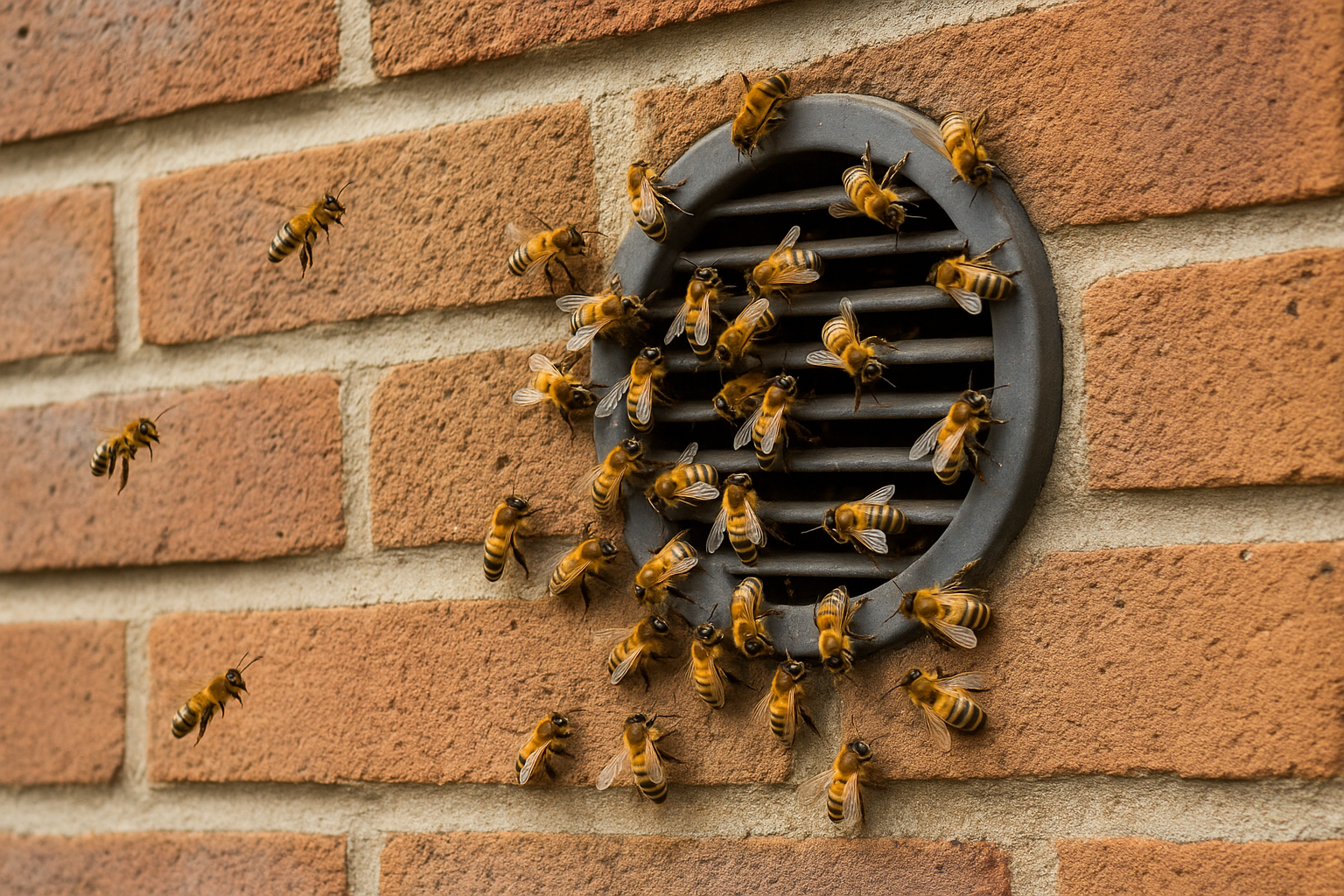Bee Management & Relocation
Professional bee management with environmentally-friendly, humane relocation methods to protect these important pollinators while resolving issues at your home or business.
Pest Control Experts
Sustainable Pest Control

Fast, professional service. Problem solved completely with no return of pests. Highly recommend!
Understanding Bee Problems
Bees can create structural issues when they establish colonies in wall cavities, roof spaces, or other parts of your property. While beneficial to the environment, established bee colonies can cause honey and wax buildup that attracts other pests and damages building materials. Left unmanaged, bee colonies can grow substantially and become increasingly difficult to relocate safely.

Signs You Have A Mole Problem
Increased Bee Activity
Visible Nests or Swarms
Buzzing Sounds
Need Help With Your Bee Problem?
Contact us today for a prompt, professional assessment. Our experienced team will identify your pest issue and recommend the most effective, environmentally responsible solution.
Most pest problems resolved within 48 hours of first assessment.
Our Bee Control Process
Our thorough 5-step process ensures safe bee management with environmental responsibility and wildlife protection.
Initial Assessment
Hive Location & Analysis
Customised Solution
Professional Management
Prevention & Protection
Ready to Solve Your Pest Problem?
Most pest problems resolved within 48 hours of first assessment.
Areas We Serve
Providing professional pest management services throughout Leicestershire, Rutland, Northamptonshire & Cambridgeshire. Contact us to confirm we cover your location.
- Cambridge
- Peterborough
- Ely
- Huntingdon
- St Neots
- St Ives
- Wisbech
- March
- Whittlesey
- Chatteris
- Soham
- Ramsey
- Yaxley
- Sawtry
- Cambourne
- Leicester
- Loughborough
- Market Harborough
- Melton Mowbray
- Hinckley
- Coalville
- Ashby-de-la-Zouch
- Wigston
- Oadby
- Lutterworth
- Earl Shilton
- Oakham
- Uppingham
- Empingham
- Ketton
- Cottesmore
- Edith Weston
- Great Casterton
- Langham
- Northampton
- Kettering
- Corby
- Wellingborough
- Rushden
- Daventry
- Towcester
- Brackley
- Desborough
- Rothwell
- Thrapston
- Oundle
- Raunds
- Irthlingborough
- Burton Latimer
What Our Customers Say
Don't just take our word for it. See what homeowners and businesses throughout Leicestershire, Rutland, Northamptonshire, and Cambridgeshire have to say about our pest control service.
Posted onTrustindex verifies that the original source of the review is Google. Absolutely brilliant job with eliminating my rat problem. Gavin and Ross were very professional, they gave me great advice on how to help prevent the rat problem from happening again. They kept in touch with me on the process of eliminating the rats and checking in with me to see if everything was okay still. I highly highly recommend Less Pest Pest Control, if you have rodent issues.Posted onTrustindex verifies that the original source of the review is Google. Gavin made contact with me swiftly about my pest issue. Explained the process clearly and fit us in relatively quickly. Ross was polite and professional and I was happy to leave him to get on with the job. Have been finding dead bed bugs since which is a positive sign. Fingers crossed it has done the trick! Thank you.Posted onTrustindex verifies that the original source of the review is Google. Fantastic service. Extremely knowledgeable and friendly. I’ve already recommended your services to my neighbour.Posted onTrustindex verifies that the original source of the review is Google. Gavin and team highly professional and went out of their way to accommodate me, definitely recommend them if you have any 'unwanted visitors'.Posted onTrustindex verifies that the original source of the review is Google. Posted onTrustindex verifies that the original source of the review is Google. Used Gav now a number of times, very reliable, informative and proficient. Highly recommended.Posted onTrustindex verifies that the original source of the review is Google. Less Pests have always been really helpful. Quick reply to any questions or concerns and goes above and beyond to help in anyway they can. I highly recommend 👌Posted onTrustindex verifies that the original source of the review is Google. Excellent service reliable and professional. I have used this service on several occasions and have always been satisfied with Gavin’s customer service. Strongly recommendedPosted onTrustindex verifies that the original source of the review is Google. Excellent service both timely, reliable and professional We have used this service several times and have always been satisfied with Gavin’s customer service Strongly recommendedPosted onTrustindex verifies that the original source of the review is Google. Gavin is brilliant. Reliable, punctual and of course very effective at his job. Delighted to recommend himLoad more
Have a question On Mole Control? check these answers
Find answers to common questions about our air conditioning installation services.
Whenever possible we relocate honey bee colonies to safe environments where they can continue their essential role as pollinators. We only use control methods as a last resort for aggressive colonies that pose a significant risk.
Bees are typically furrier with rounder bodies and are crucial pollinators. Wasps have smoother, more slender bodies with narrow waists and are predatory insects. Bees generally only sting when threatened, while wasps can be more aggressive.
Most bee species are protected to some degree. Our specialists are trained to identify different species and use appropriate, legal methods for management that comply with wildlife protection regulations.
A typical honey bee colony relocation takes several hours to ensure the queen and majority of the colony are safely removed. For established colonies in structures, more extensive work may be required.
After proper removal and sealing of entry points, bees are unlikely to return to the same location. We provide prevention advice to minimize the chance of attracting new colonies.